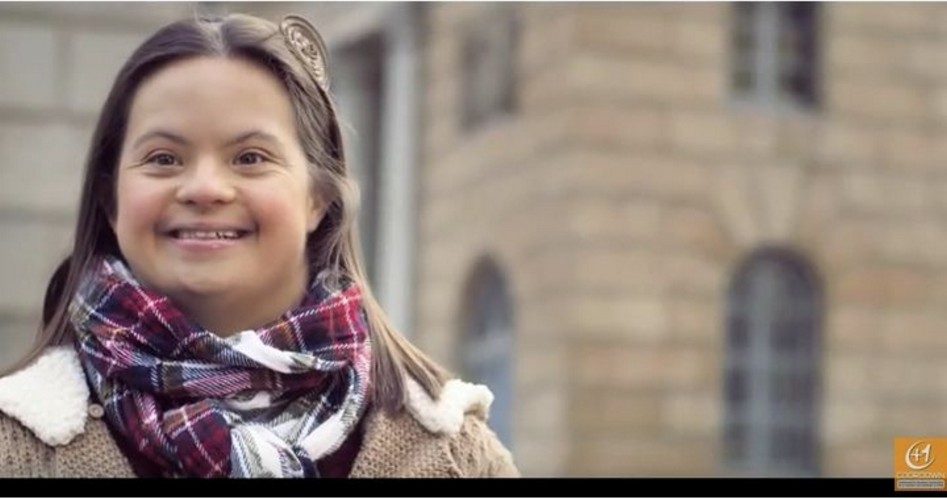
Cursing, nudity, and even, according to one blogger, “movies with group sex and fetishistic behavior” are, it seems, perfectly acceptable things to broadcast on French television. But an award-winning video that shows people with Down syndrome leading happy, productive lives? Forget about it.
On November 10, the French Council of State, the country’s supreme court for administrative law, rejected an appeal of an earlier ruling by the Superior Council of Audiovisual Content, France’s television regulator, prohibiting the telecast of the two-and-a-half-minute “Dear Future Mom” video. The Council of State declared the video “inappropriate” for television broadcast because it is “likely to disturb the conscience of women who had lawfully made different personal life choices,” i.e., those who had aborted their Down syndrome babies.
Abortion of unborn babies diagnosed with Down syndrome is a serious and growing problem, particularly as prenatal testing for the condition is becoming more common. Worldwide, about 90 percent of Down syndrome babies are killed in the womb; the French rate is 86 percent.
“Dear Future Mom” was created in 2014 for World Down Syndrome Day, whose purpose is “to help raise awareness of what Down syndrome is, what it means to have Down syndrome, and how people with Down syndrome play a vital role in our lives and communities,” according to Down Syndrome International. World Down Syndrome Day is recognized by the United Nations, hardly a bastion of pro-life sentiment.
The video was assembled in response to an e-mail from an expectant mother to CoorDown, an Italian Down syndrome organization, in which she expressed fear over the type of life her child, who had been diagnosed with the condition, would have. The video features smiling people with Down syndrome of different ages and nationalities describing the relatively normal lives they lead: walking, talking, going to school, traveling, getting jobs, living on their own, and loving their moms and dads. It acknowledges that there will be difficulties, but asks, “Isn’t it like that for all mothers?”
“Dear Future Mom” has been viewed by over 7.2 million people on YouTube and has won multiple international awards, including six Lions from the 2014 Cannes Lions Festival of Creativity, held, of course, in the same country whose government — so far, the only one in the world — deems it unfit for broadcast.
People with Down syndrome, their families, and their advocates appealed the initial decision by France’s TV regulator and were both disappointed and disturbed by the rejection of their appeal, seeing it as an effort to hide the truth about Down syndrome in deference to the eugenic-abortion agenda.
Renate Lindeman, a mother of two Down syndrome children, wrote at the Huffington Post:
So our kids, whom studies from the USA and the Netherlands have proven to be much happier than the cranky, sulky bunch who go trough [sic] life without Down syndrome, are banned from public television because their happy faces make post-abortion women feel uncomfortable. Women must continue to believe in the myth that society and medical professionals portray; that Down syndrome is a life of suffering, a burden to their family and society. Obviously, if the truth gets out that 99% of people with Down syndrome are happy with their lives, society may start to question the systematic screening and deliberate mass elimination under the pretense of health-care and women’s rights.
Lindeman worries that attempts to assuage the consciences of women who have aborted their Down syndrome babies will go beyond banning videos to the institutionalization of people with Down syndrome to keep them from being seen at all. “This ban,” she explained, “is akin to putting people with Down syndrome away because their presence ‘confronts’ society with the reality of their systematic eradication. Eradication not to ‘prevent suffering’, but because authorities have decided that their differences place a burden on our lives and society.” (One commenter on Lindeman’s piece observed that if the French government really wants to protect the fragile consciences of post-abortion women, it ought to ban all videos featuring smiling children.)
The Lejeune Foundation, which opposes the abortion of Down syndrome babies, says it will appeal the French TV ban to the European Court for Human Rights. The Global Alliance for Disability in Media and Entertainment has also created an online petition asking the French government to lift the ban, saying, “The discriminatory ban of the video sends the message that people with Down syndrome are unwelcome in society and has impacted the Down syndrome community around the world who have seen it as a rejection of the effort to challenge negative stereotypes and societal prejudices and to assert the equal and inherent value of the lives of people with Down syndrome.”
Lindeman, meanwhile, has an even better suggestion:
Let’s not ban the video but make it compulsory for every couple considering a selective abortion for Down syndrome. Let’s show them the truth that families with Down syndrome have an enormous [sic] good quality of life. Let’s show a future of hope, unconditional love and yes, a lot of smiles and happiness. To those who persevere in their negative, discriminatory view on life with Down syndrome I would like to say: you may be free to make a choice; but you are not free from the consequences of that choice. Our children should not be the ones bearing the consequences of your choice.
Truth and consequences in the postmodern world? One can only hope. Human lives, after all, are at stake.



